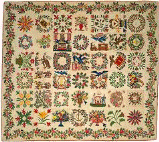Textile Society of America

Textile Society of America: Symposium Proceedings
Date of this Version
2016
Document Type
Article
Citation
Crosscurrents: Land, Labor, and the Port. Textile Society of America's 15th Biennial Symposium. Savannah. GA. October 19-23. 2016
Abstract
During the First World War, American women were encouraged to support national defense by conserving food, sewing clothes for refugees, and knitting comforts for servicemen sent abroad to fight. Groups like the Navy League and the Red Cross promoted knitting for the troops as a necessity for the security of the home front, and for the comfort of servicemen abroad. By the end of the war, knitters had hand-knit millions of garments to send to servicemen, an act of compliance that supported an overseas war--one that had aroused bitter resistance only a few years before. Defense knitters knit in private, in semi-public spaces, and in very public spaces. The half finished garments traveled with the knitter as she visited friends and Red Cross work rooms. Once completed they traveled across the ocean to clothe servicemen fighting on ships and in the trenches. The creation of these garments required the physical and emotional labor of the maker and the coordination of charitable organizations, yarn producers, and publishers. Knitters had to acquire specific materials, follow a written pattern exactly, and then return the finish garments to an organization like the Red Cross. The investment of time, money, and materials was substantial, and wool rationing and labor concerns at times made knitting controversial. Through images of war posters, knitting patterns, and magazine covers, this poster presentation will discuss the importance of the physical and emotional labor of knitting for servicemen, and the role of women in the effort for national defense. As these garments traveled from the states to the trenches, the emotional labor invested into each stitch by anxious knitters hoping to “do their bit” was a personal symbol of the national defense program, and a way to remind servicemen abroad that they were remembered.
Included in
Art and Materials Conservation Commons, Art Practice Commons, Fashion Design Commons, Fiber, Textile, and Weaving Arts Commons, Fine Arts Commons, Museum Studies Commons


Comments
Copyright 2016 by Rebecca Keyel.